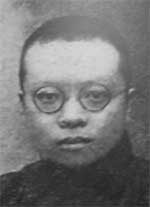 Two days ago was the 68th anniversary of the death of Qian Xuantong (Qián Xuántóng / 錢玄同 / 钱玄同 / Ch’ien Hsüan-t’ung) (1887–1939), a phonetician, philologist, and professor of literature at Peking University. Although he isn’t well known today, Qian was an important contributor to the reforms associated with the May 4 movement. He also helped renew debate about script reform in China.
Two days ago was the 68th anniversary of the death of Qian Xuantong (Qián Xuántóng / 錢玄同 / 钱玄同 / Ch’ien Hsüan-t’ung) (1887–1939), a phonetician, philologist, and professor of literature at Peking University. Although he isn’t well known today, Qian was an important contributor to the reforms associated with the May 4 movement. He also helped renew debate about script reform in China.
Just about the time that the National Phonetic Alphabet succeeded in gaining ascendancy over the Mandarin Alphabet and other schemes, the evolution of literary and political movements into a new stage gave rise to renewed consideration of the roman alphabet as the basis for reform of the Chinese written language.
What seems to have initiated the new stage of discussion was a letter written in March 1918 by Ch`ien Hsüan-t`ung, a well-known philologist and professor of literature at National Peking University, to Ch`en Tu-hsiu, who at the time was editor of La Jeunesse, the leading organ of young Chinese intellectuals, and who soon afterward became one of the founders of the Chinese Communist Party. In his letter Ch`ien Hsüan-t`ung expressed approval of Ch`en Tu-hsiu’s demand for a break with the Confucian ideology which had dominated Chinese life for more than two thousand years, and also offered his idea as to how this was to be carried out. “If you want to abolish Confucianism,” he said, “you must first abolish the Chinese script.” To his mind there was little of value in Chinese literature, 99.9 per cent of which he dismissed as merely transmitting Confucian ideology and Taoist mythology.
It seemed to Ch`ien that the ideographic [sic] script could not be adapted to the needs of modern China. He also saw no solution in the attempts which had thus far been made to apply a phonetic system of writing to Chinese. Indeed, it appeared to him that it would be impossible to apply a phonetic system of writing to Chinese at all. These views also led him to the conclusion, reached earlier by Wu Chih-hui and others, that Chinese writing itself would have to be abandoned and replaced by Esperanto.
I seem to remember that someone in Japan was driven to distraction about that country’s orthography and making a similar proposal about switching from Japanese to Esperanto. Or am I imagining that?
At any rate, others soon convinced Qian of the error of his ways, and before long he was a strong supporter of romanization, as were many others of his generation, including Lu Xun. By the way, Qian was the one who convinced Lu Xun to start writing stories. That alone should be enough to make the world forever grateful to him.
I strongly recommend the first of the readings below, from which the above quote was taken. It’s interesting reading.
sources:
- “One State, One People, One Language,” from Nationalism and Language Reform in China, by John DeFrancis, 1950
- 1939 nián 1 yuè 17 rì: Qián Xuántóng bìngshì yú Běijīng (1939年1月17日 钱玄同病逝于北京), January 17, 2007

saluton,
mi tiun interesan artikolon legis, mi amas lingvojn. Por mi chiu lingvo estas vivavta estajho kaj esteco. Pro tio mi estas kontraw chiuj proponoj kiuj provus anstatawi iu ajn lingvo kun alia lingvo.
mi estas duon-chino (mia edzino estas kantonino) Mi estas italo de Lombardio kaj mia lingvo unua estas Okcidenta Lombarda, mi estas ankaw de origino rusa kaj veneta (patrino) kaj portugala (patro) Mi vivis en preskaw tuta mndo, mi havas diversajn lingvojn kiel patrolingvo
Mi kredas ke esperanto estus la solvo al problemo de interkomunikado, sed internaciismo ne estas kosmopolitismo Do mi kredas al respekto de chiuj lingvoj kaj kulturoj
saluton mario